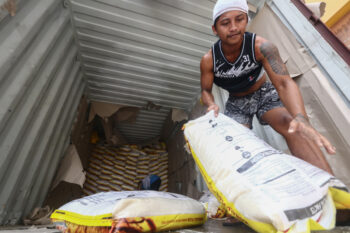GENERAL SANTOS CITY (MindaNews / 18 Dec) – Under no Philippine president other than Rodrigo R. Duterte has the Constitution been so blatantly trivialized and mocked. Abetted by the Supreme Court, this was so in the quo warranto ouster of Chief Justice Maria Lourdes Sereno and the still unresolved plot to revoke the amnesty granted to Sen. Antonio Trillanes III and to revive his amnestied rebellion and coup d’état cases.
Worse is the martial law in Mindanao. From 60 days, May 23 to July 22, 2017, it was extended to December 31, 2017 then to December 31, 2018 and, last December 12, to December 31, 2019. Unless the third extension is questioned before the Supreme Court and the Court disallows it, Mindanao martial law will last for 953 days or two years, seven months and nine days, counting from May 23, 2017 when it took effect.
Only Duterte knows if it will be extended again and again for December 31, 2020, December 31, 2021 and June 30, 2022 — co-terminus with his six-year term.
Of the last extension, we saw the continued subverting of the Constitution in declaring martial law other than on the bases clearly and specifically mandated and to prolong it contrary to provisions limiting it. It has been amended without a plebiscite.
The Constitution, Article VII, Section 18, provides: “… In case of invasion or rebellion, when the public safety requires it, he [the President] may, for a period not exceeding sixty days, suspend the privilege of the writ of habeas corpus or place the Philippines or any part thereof under martial law….” (Bold, italics supplied)
Section 18 further provides: First, “… Within forty-eight hours from the proclamation or suspension, the President shall submit a report in person or in writing to the Congress. The Congress, voting jointly, by a vote of at least a majority of all its Members in regular or special session, may revoke such proclamation or suspension, which revocation shall not be set aside by the President. …” (Bold, italics supplied)
Second, “… Upon the initiative of the President, the Congress may, in the same manner, extend such proclamation or suspension for a period to be determined by the Congress, if the invasion or rebellion shall persist and public safety requires it.” (Bold, italics supplied)
Proclamation No. 216
The President issued on May 23, 2017 Proclamation No. 216 declaring martial law in “the Mindanao group of islands” – which included Sulu, Tawi-Tawi and Basilan – following the break out of hostilities in Marawi City, Lanao del Sur between the “Maute terror group” and the government armed forces. Granted, the terrorists committed an act of rebellion, according to the Revised Penal Code.
The question was why put the entire Mindanao, Sulu, Tawi-Tawi and Basilan under martial law? Did “public safety” in the five regions “require it”? While the Supreme Court later ruled to moot the issue, its validity remained. Except for the excessive damage inflicted on Marawi City¸ more by the military forces, what was the Marawi “siege” compared to the many years of MILF rebellion that saw no martial law declared? And so it was when the Misuari MNLF forces “invaded” Zamboanga City in September 2013.
In pure and simple truth, did the Maute rebellion satisfy the 1987 Constitution?
Duterte reported the declaration in writing to the Congress on May 25. The two Houses, in separate resolutions – the Senate on May 30, 2017 and the House of Representatives on the next day – expressed their full support of the Proclamation. The majority blocks saw no need for a joint session to deliberate on it. Satisfied, after a briefing from the Palace, with “the sufficiency of the factual basis for the issuance” of the proclamation, they “found no reason to revoke it”?
Was this in compliance with the 1987 Constitution?
On the contrary, the opposition block in the Senate issued a resolution asking for a joint session to deliberate on Proclamation No. 216.
Speaker Pantaleon Alvarez explained why, according to his own reading of Section 18, it was not necessary for the Congress to convene in joint session to vote on the martial law declaration. To this the House of Representatives and the Senate concurred.
He said, there is nothing in the Constitution stating that the Congress needs to have a special session to discuss the proclamation. A joint session is needed only for the members to listen to the President if he reports in person. Since President Duterte reported in writing, each member was only furnished a copy. Later, they issued a resolution supporting the declaration. He postulated that it is the duty of the Congress to listen to the President, not the President to the Congress.
However, he said, should the President ask for the extension of martial law, the Congress would have to meet in joint session to vote on it. So they did for the three extensions that the President successively requested later.
Section 18 says that the Congress should act on the request for extension in the same manner as acting on the original 60-day declaration. To be consistent, the Senate and the House of Representatives should only have issued separate resolutions to support the three requests for extension when they found no reason to reject them after a briefing from the Palace as they did in supporting the original 60-day request.
Is this what Section 18 says? Did the Congress, through the Speaker, not amend the 1987 Constitution without a plebiscite to suite their convenience?
The Extensions
When the request for the first extension was filed, the “siege” of Marawi was still going on. Hence, the “actual rebellion” as upheld by the Supreme Court still applied. [Aside: If the meaning of “siege” were to be strictly followed, Marawi City was not sieged by the Maute terror group. It was the group which had occupied a portion of the city that was sieged by military forces. – ppd].
But this was not the case of the second and third extensions. The “siege” was declared over on October 23, 2017, the ISIS-inspired Maute terrorists annihilated. Yet, Duterte asked for the extension of martial law to “ensure total eradication of DAESH-Inspired Da’awatul islamiyah Waliyatui Masriq, other like-minded Local/Foreign Terrorist Groups and Armed Lawless Groups, and the communist terrorists and their coddlers, supporters, and financiers.” (philstar.com – December 13, 2017)
In various news reports, Duterte in requesting the Congress for a third extension, together with his security officials, the military and the police, cited the same reasons in 2017 to indicate the persistence of rebellion in Mindanao. He noted the continuing threat posed in the entire region by the Abu Sayyaf Group, Bangsamoro Islamic Freedom Fighters, Daulah Islamiyah and the NPA.
It is amusing, if not intriguing, that while Duterte, et al., also cited other security issues including those pertaining to the Bangsamoro Organic Law plebiscite and the 2019 election they pointed out gains of martial law – reduced security threats and improved economic conditions – to justify the extension.
MindaNews on December 12 reported: “In his December 6, 2018 letter to the Senate President and House Speaker, Duterte cited the joint security assessment report submitted by Armed Forces Chief of Staff Gen. Carlito Galvez and Philippine National Police Chief Oscar Albayalde” to justify the third extension.
The security assessment listed the following accomplishments under martial law:
“[1] reduction of the capabilities of different terrorist groups through neutralization of 685 members of local terrorist groups (LTGs) and 1,073 members of the communist terrorist groups (CTGs);
“[2] dismantling of seven guerilla fronts and weakening of 19 others;
“[3] surrender of unprecedented number of loose firearms — more than 8,000 from January to November 2018;
“[4] 19% reduction of atrocities committed by CTG in 2018 compared with 2017;
“[5] 29% reduction of terrorist acts committed by LTG in 2018 compared with 2017; and,
“[6] substantial decrease in crime incidence, noting a 51% reduction in Cotabato City and 38% in Maguindanao.”
These gains are deemed encouraging. The continuation of martial law is necessary to ensure the total eradication of all threats to security and public safety.
Are these and other reasons cited in accordance with Section 18? Are the gains, contrary to being justifications for extension, not, indeed, reasons to end martial law?
Intriguing
Duterte told Malacañang reporters that he decided to extend martial law based “on the recommendation of the military and the police.” He confessed of being “not aware of the nitty-gritty happenings all over the country.” This implied the extension was really not in his initiative according to Section 18?
Why did the Congress allow it?
According to INQUIRER.net of December 5, Speaker Gloria Macapagal-Arroyo told reporters the House of Representatives was bound to heed President Rodrigo Duterte’s request for another extension of martial law in Mindanao. Later, Majority Leader Rolando Andaya, Jr. and the overwhelming majority bloc later concurred. The Senate majority block, after gamely equivocating, joined in.
Too subservient to resist the President, they ignored the doctrine of check and balance embedded in the Constitution.
The last “Whereas” clause of Proclamation No. 216 recapped the five clauses preceding to show “the capability of the Maute group … to sow terror and cause death and damage property …”, and, apparently as an afterthought, included “other terror groups” that together with the Maute group could inflict terror, death and damage to property “not only in Lanao del Sur but also in other parts of Mindanao”.
The “apparent afterthought” becoming the “evident forethought” in the requests for the second and third extensions intrigues.
To the Point
The Abu Sayyaf and the NPA antedated the ISIS-inspired Maute group of Marawi and Butig. The Abu Sayyaf, emerging during the presidency of Fidel V. Ramos, is notorious for terrorism, not for rebellion. The NPA was organized in the 1960s as the armed wing of the Communist Party of the Philippines to overthrow the government. The communist movement has social roots like the Sakdalistas and the Pulahans in the 1930s. The Maute terrorists’ capability for rebellion was blown out because of their ISIS connection.
With the Maute terrorists defeated, there should have been a new proclamation, if Section 18 would allow, not just extensions of No. 216, to address the CPP-NPA armed struggle nationwide and the tenacious Abu Sayyaf terrorism. Include the secessionist Bangsamoro Islamic Freedom Fighters (BIFF). This should answer the call of Executive Secretary Salvador Medialdea: “We cannot afford to show [our] enemies a moment of weakness in our resolve to defeat them. We cannot falter or else we lose our progress.”
The gains under Proclamation No. 216 are similar to the gains played up in military reports during the Marcos martial law. Will the Duterte martial law be different?
We think President Duterte, the military and the police knew Proclamation No. 216 expired with the defeat of the Maute terrorists. But they have manipulated facts and events to keep it alive for their own convenience contrary to Section 18.
We see how the vast majority of the members of Congress have prostrated themselves before President Duterte to do his biddings at the sacrifice of Section 18. Instead of wielding the doctrine of check and balance to defend Section 18, they lamely joined its continued mockery and trivialization.
As Salvador Panelo, chief presidential legal counsel and spokesman, has put it, if martial law in Mindanao is good, why not continue it? A statement of the century from someone not prone to jokes like his boss! What’s good for Mindanao must be good for the whole country.
Martial law is now a “new normal”, said Senators Franklin Drilon and Francis Escudero. Resigned to the predictable, Albay Rep. Edcel Lagman and other minority congressmen will question before the Supreme Court the third extension – just for the records.
Don’t let Section 18 stand in the way of good for the whole country!
(MindaViews is the opinion section of MindaNews. Patricio P. Diaz was editor in chief of the Cotabato City-based Mindanao Cross and later the Mindanao Kris before returning to General Santos City. You may email him at patponcediaz@yahoo.com.)







